2010年5月3日 報道の自由の日のパリの
イラン大使館抗議活動の様子です。
ゴミを投げ込むのがなかなか面白いです。
ちなみくしゃくしゃの紙はイランのアフマディネジャド大統領です。

【2月25日 AFP】中国政府が、インターネットの新たな規制として、「.cn」ドメインを取得する際に、規制当局者との面接と、個人情報の提供を義務づけた。これに対し、人権団体はネットの「管理強化」だと非難している。
中国のネット人口は3億8000万人以上。中国当局は「万里のファイアウオール(Great Firewall of China)」と呼ばれる大規模なシステムを導入してネットを管理しているが、これに対して米政府は撤廃せよとの圧力を強めている。
23日の中国の国営メディアによると、中国工業情報省が8日、地域当局に新たなガイドラインを出し、これに伴って前年12月以降禁止されていた個人による「.cn」ドメインの取得が解禁となった。しかし、ドメイン名を取得するには、身分証明書と写真を提出し、さらに規制当局者と面接をしなければならないという。
中国工業情報省は、この新たな規制について、オンラインポルノ対策のためのものと説明している。しかし、国際ジャーナリスト組織「国境なき記者団(Reporters Without Borders、RSF)」は、中国政府の狙いがオフラインで人びとを脅すことにあると批判し、「これらの新たな規制は、中国インターネット状況の非常に不穏な後退を示している」と述べた。
「この規制の目的は、インターネット利用者に規制当局者との面接を義務づけることで、利用者に自己検閲を行わせようというものだ。ひと言の問題発言だけで利用者を収監する権限を持った当局者と面接した後に、あえて体制批判をしようとするネット市民がいるだろうか?」(国境なき記者団)
国営英字紙・環球時報(Global Times)は24日、ウェブサイト「admin5.com」が実施したオンラインアンケートで、回答者1300人のうち7割以上が、「.cn」ドメインが解禁されても取得するつもりがないと答えたと報じた。あるウェブサイト管理者は、「方針が毎日変わる。自分の.cnドメインのウェブサイトがある日突然閉鎖されないかどうか、判断することができない」と語った。(c)AFP
http://www.afpbb.com/article/environment-science-it/science-technology/2701193/5393806
【コメント】
中国政府のネット検閲問題は以前から国境なき記者団が問題に
しています。特にこの数年は酷い状況です。ネットを管理する事で
国内での反体制的な運動を押さえ込む気なのでしょう。
私たちも新たな言論弾圧であるネット規制に抗議の
声をあげないといけません。
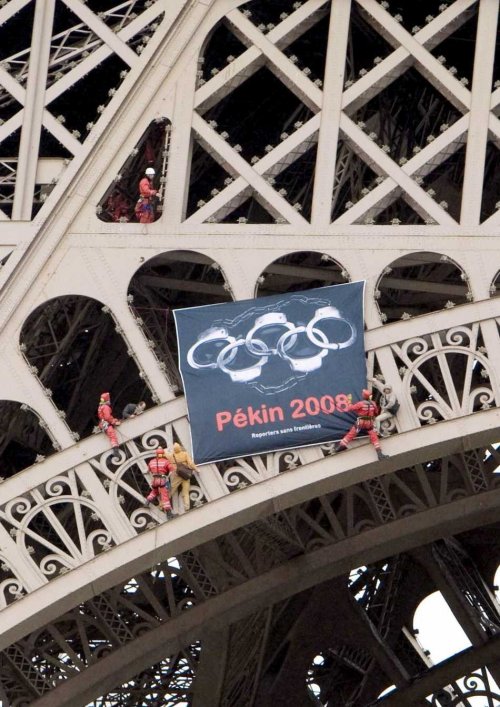 09年、記者76人が死亡 国境なき記者団の発表
09年、記者76人が死亡 国境なき記者団の発表【ブリュッセル共同】国際ジャーナリスト組織「国境なき記者団」(RSF、本部パリ)は30日、2009年に世界で報道活動に関連して殺害されたジャーナリストは前年より16人多い76人だったと発表した。拘束されたのは573人、誘拐されたのは33人としている。
特筆すべき例として、フィリピン南部ミンダナオ島のマギンダナオ州で報道陣約30人が殺された事件、イラン大統領選挙後のジャーナリストの大量逮捕を挙げた。また、アフガニスタンなどの戦争と選挙取材がジャーナリストにとり最大の脅威となったと分析した。
暴行を受けたり、脅迫されたジャーナリストは1456人(前年は929人)、世界で少なくとも167人のジャーナリストが投獄されている。
情報伝達でインターネットや携帯電話の役割が高まった結果、ネットなどの検閲が強化され、ネット検閲を実施した国の数は前年の37から60に急増。ブログ執筆者などネット上で権力批判をした151人が拘束されたという。
現時時間の31日に国際人道団体の国境なき記者団本部に行ってきました。
国境なき記者団とは昨年、北京五輪ボイコット運動で
で一緒に活動をして以来、情報交換を続けています。
事前にアポイントメントをとっておいたのでアジア担当デスクの
バンサン・ブロセルさんのさんと一時間近く面会しました。
国境なき記者団としても
北朝鮮の報道の自由や記者拘束問題を
危惧している。ただ北朝鮮問題
では絶対的な情報が少ない。
今、国境なき記者団としては
イラン・スリランカが中心になっている。
(北朝鮮問題は優先順位が低いと言う事です)
今後、北朝鮮キャンペーンも考えているので
今後も連携していきたと言う事でした。
北朝鮮向けラジオ放送しおかぜの
英文資料があったので
お渡ししたら大変興味がある様子で
担当者にコンタクトを取りたいと言うことなので
すぐに対応しました。過去に国境なき記者団は
アフリカの紛争地でのラジオ放送支援や中国の
天安門事件の際も客船をチャータしてラジオ放送を行いました。
バンサン・ブロセルさんはアメリカの自由ラジオ放送や
日本政府のふるさと風は知っているようで
したが「短波放送しおかぜ」は知らないようでした。
この点でうまく連携が出来れば良いと思います。
フランスの地では北朝鮮の情報が絶対的に
不足しているようなので日本国内の
各NGO団体から頂いた資料がお役に立つと思いますので
提供していただいた各団体に御礼を申し上げます。
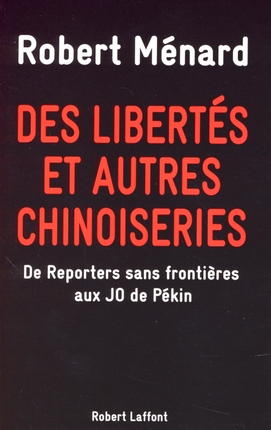
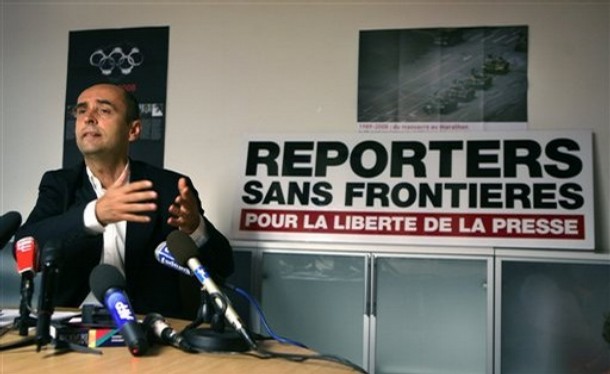
 闘うジャーナリストたち -国境なき記者団の挑戦-
闘うジャーナリストたち -国境なき記者団の挑戦- 【イラン騒乱】伝える戦い〜相次ぐ記者の追放・拘束 ネットで市民支援
【イラン騒乱】伝える戦い〜相次ぐ記者の追放・拘束 ネットで市民支援大統領選の結果をめぐる改革派の抗議行動が続くイランで、ジャーナリストの拘束が相次いでいる。当局は外国人記者の取材活動を制限しており、デモ隊と当局側の衝突の様子はインターネットの動画サイトなどを通じて知るほかない。米ネット各社は22日までに、ペルシャ語サービスの追加など“支援”の姿勢を打ち出し始めた。
フランス通信(AFP)によると、パリに本部を置く国際ジャーナリスト組織「国境なき記者団(RSF)」は21日、イランで大統領選の前後に拘束されたジャーナリストが計33人に達したと発表。「イラン・イスラム共和国は今や、ジャーナリストにとって、中国と並ぶ世界最大の監獄になった」などとする声明を出し、拘束者の即時解放を要求した。
イラン外務省報道官は20日、米国の対外ラジオ短波放送「ボイス・オブ・アメリカ(VOA)」と英BBC放送を「米英政府の代弁者となり、イラン民族の分裂をねらい動乱を扇動している」と名指しし、BBC特派員に国外退去を命じた。米誌ニューズウィークの男性記者は容疑不明のまま拘束されているという。
外国メディアの取材が制限される中、国際社会の支持を求める改革派支持者らはインターネットを駆使して騒乱の現状を発信している。米CNNによると、ソーシャル・ネットワーキング・サービス(SNS)大手「ツイッター」上に「ネダ」と呼ばれる16歳の少女が民兵の銃撃で死亡したとされる情報が公開された。動画投稿サイト「ユーチューブ」には、この少女とみられる人物が路上に倒れ、数人の男性に介抱される様子が流された。
米インターネット検索大手グーグルはペルシャ語の翻訳サービスを開始。傘下のユーチューブでは通常は削除対象となる過激な暴力描写が含まれる映像も、イランの抗議行動関連に限って規制を解いている。(川越一)
http://sankei.jp.msn.com/world/mideast/090622/mds0906221832013-n1.htm
【パリ支局】国際ジャーナリスト組織「国境なき記者団」(本部パリ)は21日、イラン大統領選後に逮捕された同国内のメディア関係者は確認されただけで33人に上ると発表した。
33人の内訳は、ジャーナリスト23人と反体制派のウェブサイト関係者10人。同組織は、イラン・ジャーナリスト協会のマザルーイ会長が20日朝、逮捕されたことも確認。他にも確認が取れないものの、拘束された可能性のあるジャーナリストが多数いるという。
一方、米誌「ニューズウィーク」は21日、同誌のバハリ記者が同日朝、テヘラン市内で拘束されたことを明らかにした。同誌は「令状もなく拘束したことを強く非難する。イラン政府に即時の釈放を要求する」などとした声明をウェブ上で発表した。
バハリ氏はカナダ国籍で、映画製作者としても活動していたという。
http://mainichi.jp/select/world/news/20090622dde007030015000c.html
【コメント】
「国境なき記者団」の声明ですが記者がイランで多数拘束されている
ようです。報道の自由に守るために国際社会の対応が求めます。
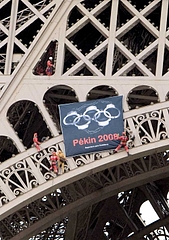
(CNN) 保守強硬派の現職アフマディネジャド氏が勝利したイラン大統領選をめぐり、国際ジャーナリスト組織「国境なき記者団」(RSF、本部・パリ)は14日、イラン当局による検閲や報道関係者の取り締まりを理由に、各国は選挙結果を承認すべきではないとする声明を出した。
RSFは同日までに、記者4人が当局に逮捕されたことを確認。さらに10人が行方不明になっているという。
RSFは声明で、「民主選挙」の条件として「報道機関が自由に選挙プロセスを監視でき、不正疑惑を調べられること」を挙げ、「アフマディネジャド氏の『再選』はどちらの条件も満たしていない」と批判した。
12日に実施された大統領選では中立的な組織による監視が認められず、外国人記者は選挙結果に抗議するデモの取材を阻止された。インターネット上では、当局が英BBCなど外国のニュースサイトや、反大統領派のサイト、ソーシャル・ネットワーキング・サービス(SNS)へのアクセスを遮断している。
また、首都テヘランからはCNNのプロデューサー、ロイター通信の記者らが警官に殴られたケースが報告されている。
2009年6月17日 21時7分 更新:6月17日 22時31分
【テヘラン春日孝之】イラン大統領選後の混乱に伴い、政府当局が内外メディアへの報道統制を強めている。選挙前、当局は外国から報道陣を積極的に受け入れた。「民主化の進展」をアピールし、イスラム体制への国民の支持を誇示する狙いだったが、開票絡みの不正疑惑が体制の根幹を揺るがしかねない騒乱を招き、一転して門戸を閉ざした形だ。
文化イスラム指導省は16日、毎日新聞などに、記者証を無効にし、支局外での取材を禁止すると通告。担当者は「選挙以外の取材でも、トラブルが生じ、治安当局に逮捕された場合は一切関知しない」と述べた。
選挙報道に絡む臨時取材ビザ(7〜14日間)は延長せず、当面、新たなビザ発給もしないという。
ファルス通信によると、当局は大統領選を前に、テヘラン駐在の外国メディアとは別に「44カ国、540人」の外国人記者に臨時取材ビザを発給した。外国メディアの多さを地元紙で紹介し、「民主的な大統領選」をいかに国際社会が注目しているかを強調した。
体制要人は投票前、高い投票率は「イスラム共和国の信頼性を高める」(ラフサンジャニ元大統領)と強調。「イスラム体制の土台を強固にする」(ラリジャニ国会議長)として投票を呼び掛けた。
今回初めて導入された候補者総当たりのテレビ討論は白熱し、自由な論議が内外の関心を集め、過去最高の高投票率につながった。だが、こうして醸成された自由な雰囲気は、反大統領派が開票の「不正」を追及し、イスラム革命以来最大規模の反政府運動を引き起こす素地にもなった。
イランのメディアが元々報道規制を受けていたため、反大統領派は外国メディアを通して国内情報を入手する一方、国内では報じられない情報などを提供してきた。当局はこうしたメディアの動きが「混乱に拍車をかける」と判断、規制強化に踏み切った。
国境なき記者団(本部・パリ)によると、選挙後から16日までに少なくとも11人のイラン人ジャーナリストが逮捕され、オランダのテレビ記者2人が拘束後、国外追放された。携帯電話でデモを撮影した市民が逮捕された例もあるという。
http://mainichi.jp/select/today/news/20090618k0000m030077000c.html

イラン政府の公式発表によると、12日にイランで行われた大統領選では62%の得票率で現大統領のマフムード・アフマディネジャド氏の再選が決まった。しかし、反対派は違反行為があったと主張している。
法的問題に関する最高監督機関である監督者評議会は、異議申し立てにより投票数を一部数え直すと発表した。だが、選挙の結果が無効になることはないという。
この再集計の発表を受け、スイス連邦外務省 ( EDA/DFAE ) は
「イラン国民にとって大切なこの問題には慎重な姿勢が不可欠。この再集計が十分慎重に行われることを望んでいる」
と公式に発表した。
イランの警察はここ数日間続いた抗議の集会を武力で抑圧し、これまでに15人が死亡したとも報道されている。また、国内外のマスコミはイランでの報道活動を妨げられており、「国境なき記者団」によるとイラン人の記者11人が逮捕された。さらに行方不明となっている記者の数も10人に上るという。
swissinfo.ch、外電
http://www.swissinfo.ch/jpn/news_digest.html?siteSect=104&sid=10837735&cKey=1245222012000&ty=st
【コメント】
イランでの言論弾圧が続いています。特に近年の例である
ネット規制も行われています。全く言語道断な事です。
この会のモットーである『報道の自由なくして人権は守れない』
です。今後もイランの動向を注視していきたいです。

[ワシントン 2日 ロイター] 今月4日の天安門事件20周年を前に、当時の民主化運動の学生リーダーだった王丹氏(40)が2日、当地でロイターのインタビューに答え、インターネットが中国に民主化への変革をもたらすなどと語った。
現在、ロサンゼルスで亡命生活を送る王氏は、MSN、スカイプ、ツイッター、フェースブックといったインターネットサービスを利用しているおかげで、「中国本土にいる多くの人とコンタクトでき、亡命中だという気がしない」と言う。
王氏は、自分が亡命した1998年に比べ、現在の中国がはるかに豊かで影響力を持つ国になったことを認めながらも、共産党の一党独裁が依然続いていることから、「政府の基本的な特質は変わっていない」とみる。
しかし、インターネットが国と社会とのあつれきにおいて重要な武器になるとの見方を示し、「政府はインターネット上の市民社会の活動をコントロールできなくなっている」と指摘。インターネットやソーシャル・ネットワーキング・サービス(SNS)によって「厳しい検閲があったとしても、ますます多くの若い世代が真実を発見することができる」と語った。
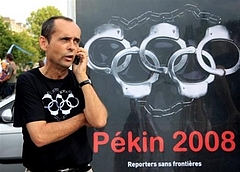
国際ジャーナリスト組織「国境なき記者団」が同日発表した報告によると、中国のすべてのメディアとインターネットで、天安門事件の情報について報道管制が行われているという。
また王氏は、オバマ米政権を含む多くの西側政府が、経済と政治両面の影響力から中国を容認しているように見えることに失望しているとした上で、「西側政府は中国の未来である市民社会にもっと注意を払ってほしい」と訴えた。
http://jp.reuters.com/article/worldNews/idJPJAPAN-38375720090603
【コメント】
王丹氏の指摘は的確だと思います。実際に中国当局は昨年来、
大規模なネット規制を行っています。ネットの世論の押さえ込みに
必死になっているようです。ある意味、ネットが突破口かも
しれませんね。

一方、ワシントンで行われている「北朝鮮自由週間」のイベントでも、二人の記者の解放を訴えるという。イベントの参加者たちは28日、米国議会議事堂前で集会を開くとともに、29日には北朝鮮人権委員会の記者会見で、記者の身柄拘束に対し国際社会が関心を寄せるよう訴える予定だ。
また、ジャーナリストによる非政府組織(NGO)の「国境なき記者団」(RSF)は今週、二人の記者の解放を求める請願書を、北朝鮮の国連代表部に送付する方針を打ち出した。
ワシントン=李河遠(イ・ハウォン)特派員